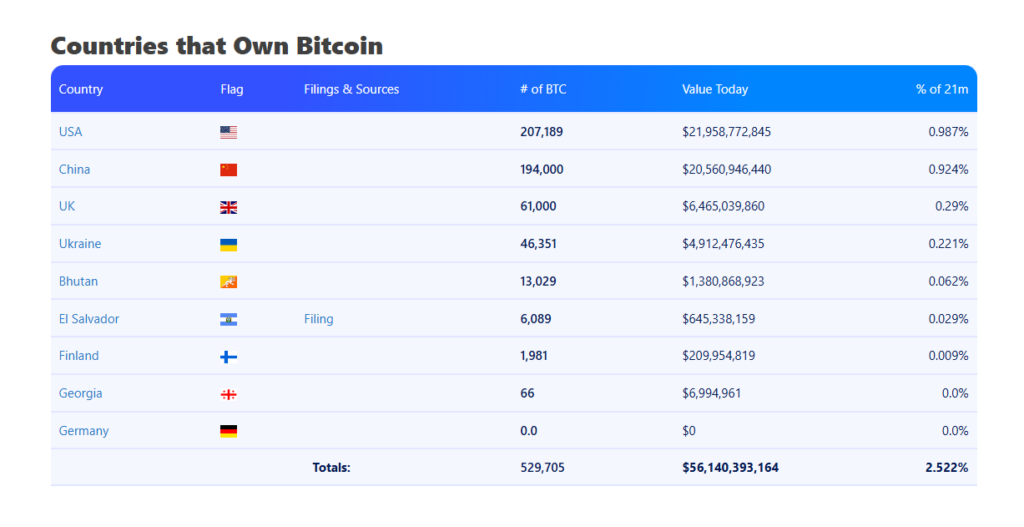Small countries are trying to find their place in the global financial system through Bitcoin. On the global financial stage, Bitcoin is no longer just an "investment toy" for investors, but is gradually becoming part of national strategy.
In May 2025, a table titled "Countries Holding Bitcoin" circulated online, revealing the Bitcoin holdings of countries worldwide: the United States leads with 207,189 coins, valued at nearly $2.2 billion; China follows closely with 194,000 coins; small countries like Bhutan and El Salvador are also on the list, holding 13,029 and 6,089 coins respectively.
A total of 529,705 Bitcoins are held by governments worldwide, representing 2.522% of the total Bitcoin supply.
However, a name absent from the table has recently sparked heated discussion - Pakistan. This South Asian country announced the establishment of a national Bitcoin strategic reserve and promised to "never sell". This move not only puts Pakistan at the forefront of cryptocurrency but also raises the question: Why are more and more small countries so enthusiastic about embracing Bitcoin?

Pakistan's Bitcoin Ambition: From Energy to National Reserves
Pakistan's Bitcoin strategy unfolds amidst much fanfare. In May 2025, at the "Bitcoin 2025" conference in Las Vegas, Bilal Bin Saqib, Special Assistant to the Government and Blockchain and Cryptocurrency Affairs Advisor, announced that Pakistan will establish a national Bitcoin strategic reserve, emulating the United States by holding these assets long-term.
The inspiration for this plan is clear: the U.S. government's 207,189 Bitcoins, valued at approximately $2.196 billion, representing 0.987% of the total Bitcoin supply, has become a "benchmark" for many countries. Although Pakistan's specific holdings have not been disclosed, its ambition is evident.
Pakistan's Bitcoin strategy goes beyond reserves. The government also announced allocating 2000 MW of surplus electricity to Bitcoin mining and AI data centers. This move directly addresses the country's energy pain point: coal-fired power projects like Sahiwal and Port Qasim currently operate at only 15% capacity, causing massive electricity waste.
Through mining, Pakistan hopes to transform these "idle energies" into economic value. At the current Bitcoin price (around $106,000 per coin), each mined Bitcoin could bring considerable income to the country. More importantly, this plan has attracted foreign investors' attention, with the government offering tax breaks to attract mining company delegations.
Meanwhile, Pakistan's digital asset management framework is accelerating. On May 22, 2025, the Pakistan Digital Asset Authority (PDAA) was officially established, responsible for regulating cryptocurrency transactions, DeFi applications, and asset tokenization, and promoting blockchain technology in government affairs, land records, and financial sectors. The establishment of PDAA was proposed by the Pakistan Cryptocurrency Committee, whose advisors include former Binance CEO CZ, injecting international experience into policy-making. PDAA also bears the mission of promoting national debt tokenization and supporting Web3 startups, attempting to transform Pakistan into a crypto hub in South Asia.
Pakistan's crypto user base is equally noteworthy. By 2025, the country's crypto users are expected to exceed 27 million, accounting for over 10% of the total population (247 million). This figure not only reflects the young population's enthusiasm for digital assets but also provides public support for the government's push towards a crypto economy. From energy to policy to user base, Pakistan's Bitcoin strategy is advancing on multiple dimensions.
Bitcoin Fever in Small Countries: From Bhutan to El Salvador
Pakistan is not an isolated case. Globally, small countries have been exploring the Bitcoin field vigorously. Bhutan, a small country at the foot of the Himalayas, has become a "hidden player" in Bitcoin mining thanks to its abundant hydroelectric resources.
According to the latest data, Bhutan holds 13,029 Bitcoins, valued at approximately $138 million, representing 0.062% of the total. These Bitcoins have been accumulated by the state-owned enterprise Druk Holdings through mining, with low hydroelectric costs giving Bhutan an advantage in mining competition.

El Salvador is a pioneer in small countries' Bitcoin strategies. In 2021, this Central American country became the world's first to adopt Bitcoin as legal tender and continues to increase its reserves. As of May 2025, El Salvador holds 6,089 Bitcoins, valued at approximately $64.53 million, representing 0.029% of the total. Its Bitcoin reserves' unrealized profits have reached $357 million, demonstrating the returns from price appreciation.
However, El Salvador's Bitcoin journey has not been smooth. The International Monetary Fund (IMF) reached a $1.4 billion loan agreement with the country in December 2024, requiring maintenance of the current reserve scale and amendment of the Bitcoin Law to remove mandatory Bitcoin acceptance by the private sector. The IMF's cautious attitude reflects Bitcoin's other side: it is both an opportunity and a potential financial risk.
Ukraine's Bitcoin holdings bear the mark of war. During the Russia-Ukraine conflict, Ukraine raised over $100 million in funds through crypto donations, which became an important source of its 46,351 Bitcoins (valued at approximately $491 million). Ukraine's crypto policy is relatively open, attracting numerous Web3 startups, with its Bitcoin holdings representing 0.221% of the total, ranking high among small countries.
In comparison, Georgia's 66 Bitcoins (valued at approximately $6.99 million) seem insignificant, possibly a symbolic holding of early confiscated assets without a clear national strategy.
Why Are Small Countries Enthusiastic About Bitcoin? The Interweaving of Economy and Geopolitics
Behind small countries' embrace of Bitcoin lies the interweaving of multiple factors: economic, geopolitical, and technological. First, Bitcoin is viewed as a tool to hedge against economic difficulties. Many small countries face pressures of insufficient foreign exchange reserves, inflation, or high debt. For example, El Salvador's public debt exceeds 90% of its GDP, and Pakistan similarly carries a heavy debt burden.
The volatility of traditional financial markets - such as stock declines and low bond interest rates - has led these countries to seek Bitcoin as an alternative asset. Its decentralized nature makes it free from the monetary policies of a single country, and especially under the dollar-dominated financial system, Bitcoin provides small countries with a possibility to enhance economic autonomy.
Secondly, energy utilization is a direct driver of small countries' Bitcoin strategies. Bhutan's hydroelectric mining and Pakistan's 2000 MW power distribution plan are remarkably similar. Many small countries possess underutilized renewable energy or surplus electricity, and Bitcoin mining can not only monetize these resources but also attract international mining enterprises and tech companies. If Pakistan's coal projects achieve full-load execution through mining, it could not only reduce electricity waste but also potentially bring considerable foreign exchange income.
Furthermore, Bitcoin policy has become a "magnet" for attracting foreign investment. In the global Web3 and blockchain boom, small countries attract startups and capital inflows through lenient crypto policies. Ukraine's crypto ecosystem has already nurtured multiple Web3 startups, and Pakistan's PDAA also aims to support startups. This strategy brings not only direct investment but can also promote technology transfer and employment growth.
Lastly, geopolitical considerations play a crucial role in small countries' Bitcoin strategies. In the dollar-dominated international financial system, small countries are often in a passive position. Bitcoin's decentralized nature makes it a potential "financial weapon" to help small countries gain more voice in global competition. Pakistan explicitly stated that its Bitcoin strategy was inspired by the US reserve plan, and the Bitcoin reserve policy promoted by the US Trump administration in 2025 further encouraged other countries to follow suit.
Comparison Between Large and Small Countries: From Seizure to Strategic Holding
Unlike small countries, Bitcoin holdings in large countries mostly come from law enforcement seizures. The 207,189 Bitcoins held by the US primarily originated from Silk Road case assets seized by the FBI; China's 194,000 Bitcoins also come from illegal asset seizures; the UK's 61,000 Bitcoins are similarly the result of law enforcement actions. These large countries' Bitcoin holdings are more like "unexpected gains" rather than active strategies.
Small countries are more inclined to accumulate Bitcoin through mining or policy-driven purchases. Bhutan's 13,029 Bitcoins come from hydroelectric mining, while El Salvador's 6,089 Bitcoins are the product of national strategy. Ukraine's 46,351 Bitcoins, though partially from donations, also reflect its proactive embrace of cryptocurrencies. Although small countries' Bitcoin holdings are low in proportion, their strategic significance is greater, aimed at achieving economic diversification or risk hedging through Bitcoin.
It is worth noting that Germany cleared its Bitcoin reserves (about 50,000) in 2024 to repay debt. This move stands in sharp contrast to small countries' long-term holding strategies and reflects the divergence in Bitcoin policies among large countries.
IMF's Scrutiny and Small Countries' Persistence
The path for small countries to embrace Bit is not smooth, with the International Monetary Fund's (IMF) scrutiny always looming. El Salvador's case is the most representative. In December 2024, the IMF reached a $1.4 billion loan agreement with El Salvador, requiring it to maintain its current Bit reserves and revise the Bit Law, removing the mandatory Bit acceptance for the private sector. The IMF warned that Bit reserves could exacerbate El Salvador's debt risks. Nevertheless, El Salvador performed strongly in economic reforms and secured the next $120 million loan from the IMF.
Pakistan's situation is more forward-looking. Its Digital Assets Management Authority (PDAA) emphasized compliance with FATF regulatory standards from the outset, attempting to win policy space under IMF scrutiny. Pakistan's crypto policy is not limited to Bit reserves but also includes widespread Block chain technology applications in government and financial sectors, and this "comprehensive layout" may provide more flexibility in negotiations with the IMF.
The IMF's cautious attitude reflects Bit's duality: it is both an opportunity for economic transformation in small countries and a potential threat to financial stability. When embracing Bit, small countries must find a balance between innovation and compliance.
Pakistan's Unique Advantages and Challenges
Compared to other small countries, Pakistan's Bit strategy has its uniqueness. First, its demographic dividend and crypto user base provide broad market potential. 27 million crypto users are not just a consumer group but also a new force for Block chain technology innovation. Second, Pakistan's energy resources and geographical location make it a potential crypto hub in South Asia. The 2000 MW power distribution plan not only absorbs excess energy but may also attract mining investments from the Middle East and China.
However, challenges are equally significant. Pakistan's power infrastructure is aging, and coal-fired projects may face environmental pressures. Moreover, crypto market volatility could threaten its reserve value. While El Salvador's Bit reserves profited $357 million, they also underwent severe price fluctuations. More importantly, Pakistan needs to cautiously advance its policies within the IMF's regulatory framework to avoid loan condition restrictions.
Conclusion: Small Countries' Bit Gamble
Pakistan's Bit strategy is a microcosm of small countries embracing the digital economy. From Bhutan's hydroelectric mining to El Salvador's legal tender experiments, to Ukraine's wartime donations, these countries see hope for economic revival in the Bit wave. Bit is not just an asset but a convergence of energy, technology, and geopolitics. Through Bit, small countries are trying to find their place in the global financial system.
However, this gamble is not without risks. Bit's volatility, IMF's regulatory pressure, and infrastructure limitations could frustrate small countries' ambitions. But as Bilal Bin Saqib said at the "Bit 2025" conference: "Once misunderstood, now unstoppable." For Pakistan and numerous small countries, Bit is not just an asset but a belief - they do not want to be absent from the digital economy's future.







